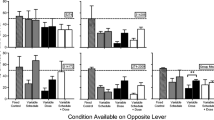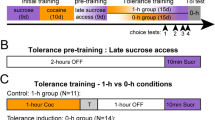Abstract
Rhesus monkeys were trained in a discretetrials choice procedure and allowed to choose between intravenous injections of cocaine (0.01–1.0 mg/kg/injection) and food presentation (1 or 4 pellets; 1 g/pellet) during daily 7-h experimental sessions. When each reinforcer was available under a fixed-ratio (FR) 30 schedule, the frequency of cocaine choice and the total drug intake increased in a dose-related manner for all monkeys. When the FR for cocaine was differentially increased, the frequency of cocaine choice decreased, shifting the cocaine dose-response function to the right and/or downward. When the FR for cocaine was at least 480, cocaine preference could not be recovered up to doses of 1.0 mg/kg/injection. In a second experiment, when the response requirement for food was differentially increased, the frequency of cocaine choice increased. These results demonstrate that altering the response requirement for cocaine or for alternative reinforcers that are available can substantially affect cocaine self-administration.
Similar content being viewed by others
References
Carroll ME, Lac ST, Nygaard SL (1989) A concurrently available nondrug reinforcer prevents the acquisition or decreases the maintenance of cocaine-reinforced behavior. Psychopharmacology 97:23–29
Carroll ME, Carmona GC, May SA (1991) Modifying drug-reinforced behavior by altering the economic conditions of the drug and a nondrug reinforcer. J Exp Anal Behav 56:361–376
DeNoble VJ, Svikis DS, Meisch RA (1982) Orally delivered pentobarbital as a reinforcer for rhesus monkeys with concurrent access to water: effects of concentration, fixed-ratio size, and liquid positions. Pharmacol Biochem Behav 16:113–117
Fischman MW, Schuster CR (1982) Cocaine self-administration in humans. Fed Proc 41:241–246
Griffiths RR, Findley JD, Brady JV, Dolan-Gutcher K, Robinson WW (1975) Comparison of progressive-ratio performance maintained by cocaine, methylphenidate and secobarbital. Psychopharmacology 43:81–83
Griffiths RR, Brady JV, Snell JD (1978) Progressive-ratio performance maintained by drug infusions: comparison of cocaine, diethylpropion, chlorphentermine, and fenfluramine. Psychopharmacology 56:5–13
Griffiths RR, Bradford LD, Brady JV (1979) Progressive ratio and fixed ratio schedules of cocaine-maintained responding in baboons. Psychopharmacology 65:125–136
Griffiths RR, Bigelow GE, Henningfield JE (1980) Similarities in animal and human drug-taking behavior. In: Mello NK (ed) Advances in substance abuse, vol 1. JAI Press, Greenwich, CT, pp 1–90
Johanson CE (1978) Drugs as reinforcers. In: Blackman DE, Sanger DJ (eds) Contemporary research in behavioral pharmacology. Plenum Press, New York, pp 325–390
Johanson CE, Fischman MW (1989) The pharmacology of cocaine related to its abuse. Pharmacol Rev 41:3–52
Lemaire GA, Meisch RA (1984) Pentobarbital self-administration in rhesus monkeys: drug concentration and fixed-ratio size interactions. J Exp Anal Behav 42:37–49
Lemaire GA, Meisch RA (1985) Oral drug self-administration by rhesus monkeys: interactions between drug amount and fixed-ratio size. J Exp Anal Behav 44:377–389
Meisch RA, Lemaire GA (1988) Oral self-administration of pentobarbital by rhesus monkeys: relative reinforcing effects under concurrent fixed-ratio schedules. J Exp Anal Behav 50:75–86
Meisch RA, Lemaire GA (1990) Reinforcing effects of a pentobarbital-ethanol combination relative to each drug alone. Pharmacol Biochem Behav 35:443–450
Nader MA, Woolverton WL (1991) Effects of increasing the magnitude of an alternative reinforcer on drug choice in a discretetrials choice procedure. Psychopharmacology 105:169–174
Spealman RD (1979) Behavior maintained by termination of a schedule of self-administered cocaine. Science 204:1231–1233
Spealman RD, Goldberg SR (1978) Drug self-administration by laboratory animals: control by schedules of reinforcement. Annu Rev Pharmacol Toxicol 18:313–339
Stitzer ML, Bigelow GE, Liebson I (1980) Reducing drug use among methadone maintenance clients: contingent reinforcement for morphine-free urines. Addict Behav 5:333–340
Stitzer ML, McCaul ME, Bigelow GE, Liebson I (1983) Oral methadone self-administration: effects of dose and alternative reinforcers. Clin Pharmacol Ther 34:29–35
Vuchinich RE, Tucker JA (1983) Behavioral theories of choice as a framework for studying drinking behavior. J Abnorm Psychol 92:408–416
Vuchinich RE, Tucker JA (1988) Contributions from behavioral theories of choice to an analysis of alcohol abuse. J Abnorm Psychol 97:181–195
Winger G, Woods JH (1985) Comparison of fixed-ratio and progressive-ratio schedules of maintenance of stimulant drug-reinforced responding. Drug Alcohol Depend 15:123–130
Woolverton WL, Balster RL (1981) Effects of antipsychotic compounds in rhesus monkeys given a choice between cocaine and food. Drug Alcohol Depend 8:69–78
Woolverton WL, Johanson CE (1984) Preference in rhesus monkeys given a choice between cocaine andd,l-cathinone. J Exp Anal Behav 41:35–43
Woolverton WL, Nader MA (1990) Experimental evaluation of the reinforcing effects of drugs. In: Adler MW (ed) Modern methods in pharmacology: testing and evaluation of drugs of abuse, vol 6. Liss, New York, pp 165–192
Yanagita T (1973) An experimental framework for evaluation of dependence liability in various types of drugs in monkeys. Bull Narc 25:57–64
Author information
Authors and Affiliations
Rights and permissions
About this article
Cite this article
Nader, M.A., Woolverton, W.L. Effects of increasing response requirement on choice between cocaine and food in rhesus monkeys. Psychopharmacology 108, 295–300 (1992). https://doi.org/10.1007/BF02245115
Received:
Revised:
Issue Date:
DOI: https://doi.org/10.1007/BF02245115




